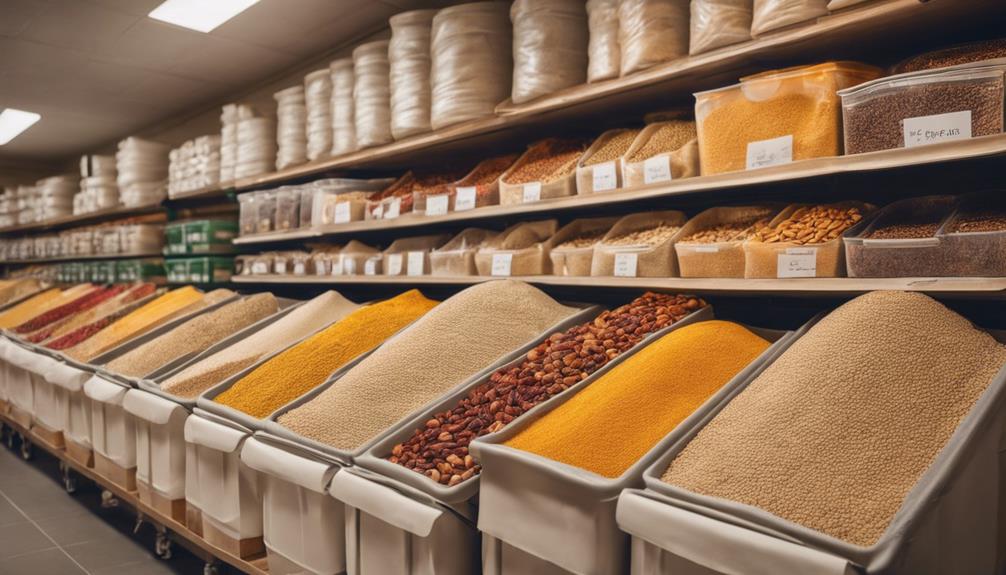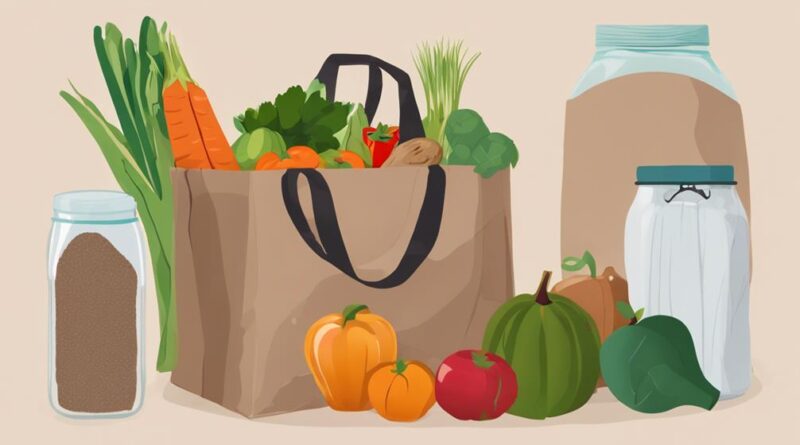Three Tips to Minimize Waste With Earth-Friendly Foods
To minimize waste with earth-friendly foods, start by meal prepping to plan efficiently and prevent overbuying. Incorporate leftovers into the next meal for less waste. Choose seasonal produce for sustainability and peak freshness. Utilize food scraps creatively in recipes or compost them for a positive environmental impact. Store foods properly in eco-friendly packaging to maintain freshness. Consider a vacuum sealer to extend shelf life and reduce plastic use. Shopping in bulk with minimal packaging and supporting local farmers can also minimize waste. Implement these tips for a more sustainable approach to food consumption and waste management.
Benefits of Buying Organic Foods
When shopping for groceries, you can reap numerous benefits by choosing organic foods over conventionally grown options. The first major advantage is the health benefits associated with organic produce. Organic foods are grown without the use of synthetic pesticides, which can often leave residues on conventionally grown fruits and vegetables. By opting for organic, you reduce your exposure to these harmful chemicals, promoting better health for you and your family. Additionally, organic farming practices prohibit the use of antibiotics and synthetic hormones in livestock, ensuring that organic meat and dairy products are free from these additives, which can have negative effects on human health.
Furthermore, opting for organic foods also has a positive environmental impact. Organic farming methods prioritize soil health and biodiversity, using techniques that help preserve natural ecosystems and promote sustainable agriculture. These practices reduce the pollution of water sources and minimize soil erosion, contributing to the overall health of the planet. By supporting organic farming, you're also supporting the well-being of farmworkers who aren't exposed to harmful chemicals in their work environment. Overall, choosing organic foods not only benefits your health but also plays a part in promoting a more sustainable and environmentally friendly food system.
Planning Meals to Reduce Waste
Looking to minimize waste and make the most out of your meals? Planning your meals strategically can significantly reduce food waste. One of the most effective ways to do this is through meal prepping. By setting aside time to plan and prepare your meals in advance, you can ensure that you only buy what you need and use up ingredients efficiently.
When meal prepping, consider portion control. By accurately portioning out your meals, you can prevent overbuying ingredients that may end up going to waste. Additionally, portioning out meals in advance can save you time during busy weekdays and help you resist the temptation of ordering takeout when you're too tired to cook.
Another tip for reducing waste through meal planning is to be mindful of leftovers. Instead of discarding leftover ingredients, incorporate them into your next meal. For example, if you have leftover vegetables from dinner, consider using them in a stir-fry for lunch the next day. This not only reduces waste but also adds variety to your meals.
Choosing Seasonal Produce
To further reduce waste and enhance your meal planning efforts, consider selecting seasonal produce for your dishes. Choosing seasonal fruits and vegetables not only promotes sustainability but also ensures that you're enjoying produce at the peak of its flavor and nutritional value. When looking for seasonal ingredients, explore local farmers markets or consider joining a community-supported agriculture (CSA) program where you can receive a variety of fresh, in-season produce directly from local farmers.
Farmers markets are excellent places to find a wide selection of seasonal fruits and vegetables. By shopping at these markets, you can support local farmers, reduce the carbon footprint associated with transporting food long distances, and enjoy produce that's fresher and more flavorful. Additionally, farmers markets often offer unique varieties of fruits and vegetables that you may not find in conventional grocery stores.
Joining a community-supported agriculture program is another fantastic way to incorporate seasonal produce into your meals. By becoming a member of a CSA, you can receive a weekly or monthly box of fresh, locally grown fruits and vegetables. This not only introduces you to new ingredients but also helps reduce food waste by utilizing the entirety of the produce you receive. By choosing seasonal produce from farmers markets or through community-supported agriculture programs, you can minimize waste, support local farmers, and enjoy delicious, earth-friendly meals.
Utilizing Food Scraps Efficiently
Consider incorporating food scraps efficiently into your meal planning to minimize waste and maximize sustainability. By utilizing food scraps creatively, you can't only reduce your environmental footprint but also discover new flavors and textures in your dishes.
Here are some sustainable practices to make the most out of your food scraps:
- Creative Recipes: Instead of throwing away vegetable peels, stems, and tops, consider using them in stocks, soups, or broths. Carrot tops can be transformed into a flavorful pesto, while citrus peels can be candied or used to infuse water with a refreshing zest. Get inventive with your cooking to make the most out of every part of your ingredients.
- Sustainable Practices: Composting is a great way to deal with food scraps that can't be used in cooking. By composting, you not only reduce waste but also create nutrient-rich soil for your garden. Additionally, consider regrowing certain vegetables from scraps, such as lettuce or green onions, by placing them in water until they sprout roots, then transferring them to soil. This not only minimizes waste but also provides you with fresh produce at no extra cost.
Incorporating these practices into your routine can help you make a positive impact on the environment while also adding a creative touch to your meals.
Composting for Organic Waste
Utilize composting as a sustainable solution for managing organic waste in your kitchen and garden to reduce environmental impact and nurture nutrient-rich soil. Composting benefits not only your immediate surroundings but also the broader community. By composting food scraps and yard waste, you can divert a significant amount of material from landfills, reducing greenhouse gas emissions and enriching the soil in your garden or community gardens.
Vermicomposting, a type of composting using worms, is a fantastic way to break down organic matter quickly. Worms help aerate the compost, speeding up the decomposition process and producing nutrient-rich castings that are excellent for plants. Setting up a vermicomposting bin can be done indoors or outdoors, making it a versatile option for those with limited space or living in apartments.
Backyard bins are another popular choice for composting organic waste. These bins come in various sizes and designs to suit different needs and preferences. By layering kitchen scraps, yard waste, and other organic materials in the bin and occasionally turning the mixture to aerate it, you can create nutrient-dense compost for your garden. Additionally, backyard bins can be a focal point for teaching children and the community about the importance of composting and reducing waste.
Storing Foods Properly
Properly storing foods is essential to maintaining their freshness and maximizing their shelf life. When it comes to eco-friendly packaging, opt for reusable containers or beeswax wraps instead of single-use plastics. These alternatives not only help reduce waste but also keep your food fresh for longer periods.
When storing fruits and vegetables, practice conscious consumption by storing them in breathable bags or containers to prevent premature spoilage. For leafy greens, wrapping them in a damp cloth before refrigeration can help retain their crispness.
Additionally, organizing your pantry with clear storage containers can help you see what you have and avoid buying duplicates, promoting conscious consumption. When storing grains and legumes, keep them in airtight containers to prevent moisture and pests from compromising their quality. Labeling containers with purchase dates can also help you track freshness and use items before they expire.
To further reduce waste, consider investing in a vacuum sealer for meats and cheeses. This not only extends their shelf life but also eliminates the need for single-use plastic bags. Being mindful of how you store your foods can significantly impact the amount of waste produced in your household while promoting sustainability and eco-conscious habits.
Shopping in Bulk for Less Packaging

When shopping in bulk to minimize packaging waste, prioritize selecting products with minimal or recyclable packaging to reduce environmental impact. Reducing waste starts with the choices you make at the store. Look for bulk items like grains, nuts, and spices that are often available in dispensers where you can fill your own containers. This not only cuts down on packaging waste but also allows you to purchase only the quantity you need, reducing the likelihood of food going bad before you can use it.
Another eco-friendly shopping tip when buying in bulk is to opt for products packaged in materials that are easily recyclable, such as glass or paper. These materials have a lower environmental impact compared to single-use plastics. Additionally, consider choosing items with biodegradable packaging whenever possible to further reduce waste.
Before heading to the store, make sure to bring your own reusable bags and containers to pack your bulk purchases. This simple habit can significantly decrease the need for single-use plastic bags provided by the store. By being mindful of the packaging choices you make while shopping in bulk, you can play a part in reducing waste and supporting a more sustainable food system.
Supporting Local Farmers
Support local farmers by sourcing your produce directly from nearby markets or participating in community-supported agriculture programs. Building farmer relationships is key to supporting sustainable agriculture practices and reducing waste. By buying directly from local farmers, you not only get fresh, seasonal produce but also contribute to the local economy and reduce the carbon footprint associated with transporting food long distances.
When you purchase from local farmers, you can often learn about their growing practices, ensuring that your food is produced in an environmentally friendly way. This transparency fosters trust and allows you to make more informed choices about the food you consume. Additionally, buying from nearby markets or joining community-supported agriculture programs can help reduce food waste by only purchasing what you need when you need it.
Participating in community-supported agriculture programs, where you subscribe to receive a box of fresh produce regularly, can also help farmers plan their harvests more efficiently, leading to less surplus and unsold produce. This direct connection between consumers and farmers supports a more sustainable food system by cutting out the middleman and promoting a closer relationship between the people who grow your food and the people who eat it.
Conclusion
By incorporating these three tips into your daily routine, you can significantly reduce your environmental impact and minimize waste with earth-friendly foods.
Buying organic, planning meals strategically, and utilizing food scraps efficiently are simple yet effective ways to make a positive difference.
Remember to support local farmers, shop in bulk, and store foods properly to further contribute to a more sustainable and eco-friendly lifestyle.
Start making these small changes today and see the big impact they can have on our planet.
